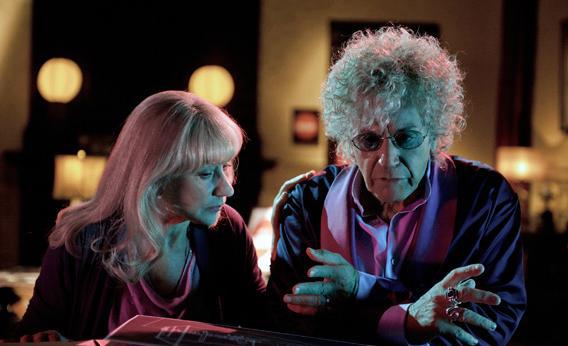The article that you are reading is not so much a pan of the HBO original Phil Spector (HBO, Sunday at 9 p.m. ET) as the rough draft of a formal complaint against it. Al Pacino gets top billing as Spector, the record producer who in the ’60s built the Wall of Sound and in 2003 shot and killed a casual date in a mansion on a California hill.
Working from his own screenplay, director David Mamet relays the tale of Spector’s first trial for that murder, concentrating on the relationship between a bad defendant and a good lawyer named Helen Kenney Baden, played by Helen Mirren.
Have you retained, in the corner of your mind scattered with tabloid papers, the image of Spector, alleged felon and convicted creep, wearing one of his less understated wigs? There’s a scene here where Spector debuts the coif to Baden—quite a shock of hair for a lawyer on the threshold of a courtroom—and Mirren delivers a priceless reaction shot. In preparing to convince the jury that he is something other than a total freak show, Baden has briefly swallowed the fiction herself, and seeing that flamboyant corona, she does a double take at her own expectations. This fine small moment comes about 80 minutes into a film that I’d rather have stopped watching after 30.
Which brings us to the matter of my grievance: Mamet and Pacino each receive credit as executive producers of Phil Spector, as does Barry Levinson, and I’m wondering if it is possible to do something analogous to a citizen’s arrest and file a credit dispute on behalf of the viewing public. Nobody produced this film. Watching it, you mentally scrawl notes in the margin of the experience, your exasperation heightened by being forced to think in elementary boilerplate: Show, don’t tell! What are the stakes? Who IS Phil Spector?
To be clear: I know who Phil Spector is, despite the filmmakers’ rather condescending distrust that everyone under the age of 40 is ignorant of his importance. In a remarkable early moment, Baden reaches into her purse, pulls out a 45 rpm record, and commands a thirtysomething colleague to identify the object. He thinks it’s like a floppy disc or something. Oh, come on. This is the movie’s idea of cultural decline: It is declared a problem that America knows this eccentric genius only as an eccentric.
For one thing, this declaration strikes me as untrue. More importantly, Phil Spector doesn’t give us a reason to care who he is under the wig, behind the weirdness, beyond the wall. It proceeds by asserting his importance and drags its audience along from there, never bothering to develop the character and instead encouraging us to follow the legal troubles of a celebrity. Meanwhile, the extent of the characterization of Baden is that she works hard and has a cold. The film is essentially a by-the-numbers legal procedural—witness prep, forensics frets, town-car chatter about the court of public opinion. (It’s not TV. It’s HBO doing Court TV.) That it happens to feature a few numbers Spector created is merely a distraction. There is no discernible reason for “Unchained Melody” to be on this soundtrack, and hearing the Ronettes in this context only makes you long for Scorsese.
A bit of subtlety on the part of the lead actor might have helped to mitigate these flaws. For that matter, a bit of acting on the part of the lead actor would have gone a long way, but Pacino is not really playing Spector; he’s doing generic Pacino. We’ve all seen him work in this mode before, but this performance never rises to the effervescent lows of such bad-Pacino classics as Any Given Sunday and The Devil’s Advocate, which is a missed opportunity, considering the character he has to work with. Phil Spector—potentially a camp classic about self-aggrandizement and megalomania—is simply a self-satisfied vanity project.
